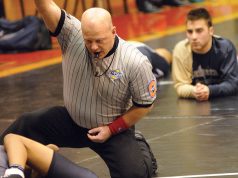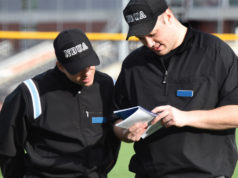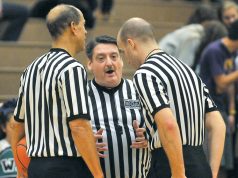E
veryone handles nerves and adversity differently.
Some believe if you don’t get at least a little nervous before a big game, you don’t understand the job. Others think you have the wrong stuff if you even blink. The late NL umpire Eric Gregg used to be so anxious before a plate assignment, nobody could talk to him. In contrast, Doug Harvey looked around Dodger Stadium before his first big league game, shrugged and said it would have taken six hours to plow it if he was still farming. Either way, we’ve all seen the coolest-looking cucumbers choke just as often as we’ve seen apparent basket cases flourish once they hit the field or court. Psychologists say overcoming anxiety comes down to how successfully we thwart our brain when it conspires to betray us. The good news is they can give us a lot of tools to win that battle.
Dr. Sian Beilock is a psychology professor at the University of Chicago, specializing in cognitive science and education. In her 2010 book, Choke, she covers the forces at work that cause athletes and business people to implode in their big moment — like a game or a sales presentation — and what they can do to prevent it. Her prescription works well for sports officials, too.
Beilock explains that the brain has two kinds of memory — working (or cognitive) and procedural. Working memory is what we use to communicate, investigate, calculate and figure out coaches; that is where we make all the decisions we need to function and it resides in our pre-frontal cortex. Procedural memory, by contrast, is the execution area and is distributed elsewhere in the brain. It’s what we use to perform stored functions like hitting a golf ball or signaling fouls.
The brain’s activity can be monitored by MRI to show how those memory types work. Suppose a concert pianist, for example, is placed in a scanner and provided a mock keyboard to recite one of her pieces. The MRI will show that much of her brain activity is procedural while her working memory is much quieter. As smart as you might have to be to play the piano, she’s reduced the task to mostly rote. That’s because working memory encodes procedural memory through continued practice, freeing working memory to do other things.
To prevent choking, we have to prevent our working memory from throttling our procedural memory, in the heat of battle. Let’s look closer at working memory. In the pre-frontal cortex, the hemispheres divide between largely verbal functions on one side and spatial functions on the other. On the verbal side, we recognize words and numbers and understand how to read, write and calculate with them. In the other hemisphere, we relate to shapes, images and spatial considerations.
In a normal person, the hemispheres share information smoothly to get the job done. In others, interesting things happen. People with ADHD, for example, are impaired on the verbal side with the result that computing capacity and their ability to focus suffer. Meanwhile, the spatial side works well and those people, free of the conventions the verbal side would prompt them about, are more likely to be out-of-the-box thinkers; the people who see an anti-alligator weapon instead of a three-wood.
If you’re a choker, the notion of “listening to the voices” isn’t really that far from the truth. Beilock says choking is a function of the associated stress when verbal memory works against you. People who are worried about success or failure tend to have the verbal side of the brain on overdrive. Thinking about those concerns consumes cognitive resources and also produces a hormonal response to the anxiety, causing more and more of the brain’s cognitive resources to be brought online. The brain has only so much energy available, however, so procedural memory starts to “brown out”: A soccer goalkeeper who has caught perhaps 10,000 kicked balls suddenly starts fumbling them when the pressure’s on. Thinking about procedural skills just makes it worse; “the yips” attack professional golfers on the putting green when bad results make them try to adjust the procedural memory skills that made them successful.
An official who chokes is usually so preoccupied with verbal memory activity that he or she starts to miss calls: the offside, ball out, charge or strike that he or she has learned to call automatically, somehow becomes more indistinct and difficult to capture at the worst possible time.
The secret to preventing that is to understand the verbal overload at work and either defuse it or circumvent it. One way to do it is to level the brain’s verbal workload with the spatial load, by changing the situation.
Students with math anxiety, for example, often have a built-in stereotype (“I’m no good at math because …”) and their fixation with it ties up verbal memory resources that could be performing calculations. Researchers have found something as simple as taking a problem read horizontally like “25-14 = ?” and rewriting it to be viewed vertically, noticeably improves performance in the math-anxious: Stacking the numbers turns it into a spatial problem and utilizes the other hemisphere’s resources that aren’t preoccupied with the thoughts of anxiety.
The other way to deal with choking is to find ways of leaving the verbal area out of the activity. Not surprisingly, Beilock says self-conscious people are prone to choking because they have so many more inward-focused thoughts that overwhelm their working, verbal memory. Brent Walker says he can help with that.
Walker is the associate athletic director for championship performance at Columbia University and is an executive board member of the Association for Applied Sports Psychology. His job at Columbia has been to work with all their athletes to get their heads in the right place to perform at peak potential. He’s done well enough that he was recently approached by the Professional Referees Organization (PRO) to help them with officiating development. PRO was formed to train and manage the top soccer officials who work in professional leagues like MLS in the U.S. and Canada. Since January, Walker has been coaching the group in how to deal with and avoid anxiety to produce a higher standard of performance.
“From a sports psychology perspective,” says Walker, “you take two approaches to dealing with anxiety. One is a cognitive approach. You’ve got to change the way you look at a situation. The other is you have to cut off that physiological response.
“Both of them become necessary because even if I teach you relaxation techniques, if you’re going to continue to look at a situation in a way that isn’t beneficial, you’re going to keep causing that physiological response.”
One aspect of that anxiety is apprehension before a game or match that can turn into substandard performance during a match. The other part is how the official responds to adversity as the match progresses. Before the match, Walker says that it’s OK to be nervous but to project one’s concern as a positive. In that approach, anxiety might cause you to think, “This is the MLS Cup Final and one bad call could cause the wrong team to win.” The cognitive approach changes the notion into, “It’s a good thing I’m on this match because one bad call could cause the wrong team to win.”
Beilock and Walker agree that people approaching stressful situations can prepare themselves by taking the time to think through their good qualities; to walk through their qualifications. That kind of reaffirmation loads the verbal part of their brain with positive thoughts so that negativity doesn’t gain a foothold.
On the physiological side, part of what Walker is doing with PRO is developing videos compiling various kinds of officiating decisions — the more contentious the better. When he shows those to the group and asks them to vote on whether calls were made correctly, there are two positive effects. One is seeing how the group often disagrees on some calls helps reassure officials that uncertainty goes with the job. That way, they’re less likely to let a tough call on the field start feeding self-doubt to their verbal side: “It isn’t supposed to be easy!” The second positive is the practice they get; the more tough calls they see, the better they get at programming their procedural memory to observe the key elements and make reliable decisions. Through that exercise and others, officials learn to feel the pressure coming and control the physiological response that would impair their performance.
Walker gives an example of the value of video practice in helping assistant referees make better offside decisions by understanding the flash-lag effect. That is an illusion where a flash and a moving object that are in the same place appear to the observer to be in different places. “When a forward’s heading toward the goal and the ball’s kicked,” Walker explains, “the human eye tells you to assume that that forward is farther ahead of the last defender than he actually is.
“A majority of incorrect calls in the World Cup are when the linesman calls offside when the forward actually isn’t.” Once the assistant referee understands the player in motion can trick him through that illusion, he’ll recalibrate his judgment to take that into account; it makes for better officiating and for better games.
Former NFL referee Red Cashion once revealed every official’s dirty little secret: “I’ve never had a perfect game.” For some of us, that’s reason enough to take poison. For others, it’s a source of ongoing discouragement — the pursuit of the Athletic Holy Grail — that makes for underachieving, and often short, careers. And for the best of us, it’s as Walker proposes it should be: a reason to buck up, accept reality and train yourself to get over unfortunate incidents, then get over yourself and move on during the game.
But isn’t it irresponsible to say, “Oops! That shouldn’t have been a penalty. I’ll get the next one right”? Walker says if that happens too often, you probably don’t belong at the level you’re working. In the meantime, it’s how you sell it to others as well as yourself that’s important. He refers to a study of English Premier League soccer referees, published in 2012 by Liam Slack, and others, at Sheffield Hallam University, in England. In interviews with those officials, a common theme in their success is their ability to communicate and build relationships with players both during the game and over their careers. They develop self-security and withstand life in the microscope of instant replay by building a rapport with the sane players and observers and learning to discount the rest.
Since officials communicate verbally for the most part, with some gestures and facial expressions added, Walker says that can be used to suppress the negative thoughts that use the same part of the brain. Quite simply, speaking to someone else diverts a lot of cognitive resources to an activity other than fretting. Making eye contact with partners and players helps too, as do emphatic signals and movements. You can even sing to yourself, much like the pianist plays — anything that doesn’t require verbal memory, where trouble can start.
How often do you see crewmates gather around an official who’s just made a big call and engage him in conversation? It can often be a second or two of inquiry followed by a heavier dose of sweet nothings, helping to prevent the official from dwelling on what just happened: That works because it’s been found that the destructive thoughts produce a physiological “afterglow,” the longer you dwell on them. You get over things more effectively the sooner you change the subject, and your partners can help if they know how.
How you get over things is a key to your success as an official, says Duke’s Greg Dale, who serves a similar role to Walker. He strongly advises that an official must rid himself or herself of the irrelevant thoughts that become distractions to focusing on the skills and actions that make the official successful. One of those irrelevant thoughts, says Dale, is any consideration of whether a coach, player, table official or Madame Defarge likes you or not.
Dale says that many coaches will try to get into your head and get you questioning yourself or trying to atone for how you think you’re being perceived. That’s when you start hesitating on calls or anticipating calls.
“When the coach is talking to you,” says Dale, “listen to the ultimate message that he or she is trying to get across. If it’s a valid argument, then I think it’s necessary to acknowledge that.
“But once you start letting it become personal for you, you start becoming angry and frustrated and distracted from what’s really relevant to be paying attention to.”
Not taking things personally is sometimes more difficult for some lower level officials to do; it can be one of the things that slows their progression, but it’s also something they can work to overcome, says Dale. Officials can make it easier on themselves by following some simple approaches to prevent the slings and arrows from taking hold. Making eye contact with the coach, engaging in discussions, showing positive body language and skimming what’s being said for an actionable point all help stifle the tendency to internalize what’s heard. Ignore the personal pronouns and focus on the descriptions that relate to how the game’s being played. By doing those things, you don’t give yourself the time to think about whether the coach may be right about how horrible he or she claims that you are. With enough practice, you stop noticing the coaches’ epithets and things get better.
By the way, our choice of partners is important. Obviously, you want competent people working with you, but now we understand that everyone deals with the butterflies differently. If one partner’s singing The Star-Spangled Banner, while the second practices yoga and the third is documenting his best qualities on the white board, the three could be in conflict before they ever leave the locker room; while helping themselves, they may be grating on each other.
At the amateur level, that might not be as big of a deal since officials tend to team up with people they know and like. At the pro level, officials are more apt to be thrust together and not necessarily be good matches. That’s why MLB, for example, allows crew chiefs to “draft” crew members from year to year: one chief’s Felix Unger is another’s Oscar Madison in their approach to preparation, deportment and good crew chemistry.
The bottom line is that officials do best when they learn to welcome adversity rather than battle it. “I’m here because I’ve shown I’m qualified for the job. I understand the environment and know that I might make mistakes, but I’m not going to make it worse for myself because I know how to handle it.”
You can do things to prevent choking.
Think about it — but not too long.
What's Your Call? Leave a Comment:
Note: This article is archival in nature. Rules, interpretations, mechanics, philosophies and other information may or may not be correct for the current year.
This article is the copyright of ©Referee Enterprises, Inc., and may not be republished in whole or in part online, in print or in any capacity without expressed written permission from Referee. The article is made available for educational use by individuals.



















